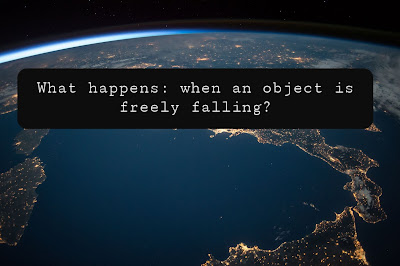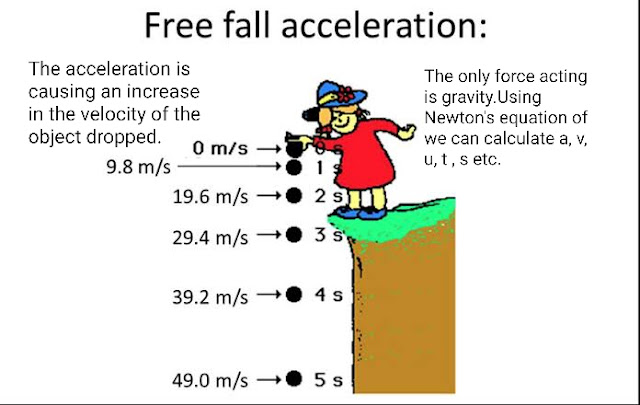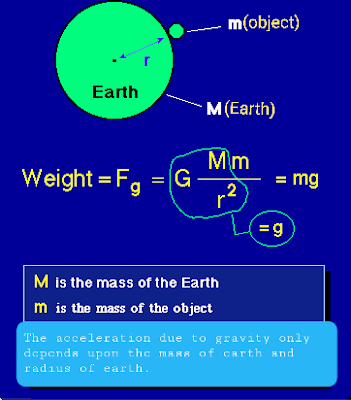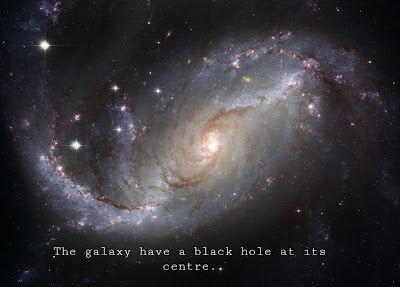Let us first understand what gravity is. Gavity also known as gravitation, is a phenomenon (not a force) of attraction of all the things that have mass-energy like planets, galaxies and light towards one another.
Don't get confuse between gravity and Gravitational Force. They are separate terms. Gravity is a natural phenomenon. Whereas, Gravitational force is a force that is a measure of attraction.
Gravity is the phenomena or cause of, why we are able to stand. Whereas gravitational force is responsible for our weight. If you go to moon then your weight becomes 1/6th of the weight on earth.
Gravity is the reason, why planets revolve around sun., and moons revolve around planets. It is the phenomena, which plays an important role in galaxy formation. Most of the galaxies have a black hole as their centre. Black hole have very large gravitational effect.
 |
| What happens: when an object is freely Falling? |
Gravity is the phenomena or cause of, why we are able to stand. Whereas gravitational force is responsible for our weight. If you go to moon then your weight becomes 1/6th of the weight on earth.
Gravity is the reason, why planets revolve around sun., and moons revolve around planets. It is the phenomena, which plays an important role in galaxy formation. Most of the galaxies have a black hole as their centre. Black hole have very large gravitational effect.
Now from Newton's laws of motion, we know that acceleration is the ratio of force applied(F) to mass of the object(m). i.e., a= F/m.
Now if F is the gravitational force and m is the mass of the object that is being influenced by gravity, then a will be the acceleration of the object that is caused by gravity. The acceleration due to gravity(of earth) is represented by 'g'. Its value is 9.8m/s². At heights, the value may be different.
Now an interesting point is that the acceleration due to gravity does not depend on the mass of the object.
If in vacuum, you drop a stone and a feather at the same time , from same height, both will reach the ground at the same time. That means for every object the acceleration is same.
So does that means that mass of the object doesn't matter at all? No. The object with more mass, will experience more force of gravity. And the object with less mass will experience less force of gravity.
But why this happens? Why 'g' does not depends upon the object. For finding acceleration due to gravity we divide the force by mass of the object. Hence the resultant is independent of the mass of the object.
The 'g' only depends on the mass and radius of the earth. For any other planet, it will depend on mass and acceleration of that planet. If mass or radius of our planet will be changing, then the value of 'g' will also be changing accordingly. But that's not the case.
Now imagine you are standing on a mountain. And you are on its edge. You are holding a stone in your hand. And suddenly you release the stone from your hands.(Remember that you have to only release it, not throw it). Now tell, what will be the acceleration of the stone? Is it 'g', above 'g' or below 'g'.
Well when you release an object from this much height, it will suffer some air resistance. Wind speeds are also very high at heights.
So, in practical life we can say that different objects will hit the ground at different time, even if they are released from same height, due to atmosphere. In practical life there are many forces acting on an object other than gravity, like air resistance, buoyant force, force due to wind speed, climate change etc.
When there is only Gravitational force acting on a body, then it is considered as free fall in Newtonian physics. There are misconceptions that in free fall something must be falling. If an object is going upwards, but the only force acting on it is gravity, then also the object is under free fall.
On earth the value of 'g' is 9.8 m/s². So an object under free fall on earth should have an acceleration of 9.8m/s².
Whereas, on moon the value of acceleration due to gravity is 1/6th of the value on earth.
Astronaut David scott demonstrated free fall on moon in August 2, 1971. He released a hanmer and a feather simultaneously from the same height. Both fell and hit the ground at the same time.
Please suggest more topics in comment box.
 |
| Free Fall |
Now an interesting point is that the acceleration due to gravity does not depend on the mass of the object.
If in vacuum, you drop a stone and a feather at the same time , from same height, both will reach the ground at the same time. That means for every object the acceleration is same.
So does that means that mass of the object doesn't matter at all? No. The object with more mass, will experience more force of gravity. And the object with less mass will experience less force of gravity.
But why this happens? Why 'g' does not depends upon the object. For finding acceleration due to gravity we divide the force by mass of the object. Hence the resultant is independent of the mass of the object.
 |
| Gravitational Force |
Now imagine you are standing on a mountain. And you are on its edge. You are holding a stone in your hand. And suddenly you release the stone from your hands.(Remember that you have to only release it, not throw it). Now tell, what will be the acceleration of the stone? Is it 'g', above 'g' or below 'g'.
Well when you release an object from this much height, it will suffer some air resistance. Wind speeds are also very high at heights.
So, in practical life we can say that different objects will hit the ground at different time, even if they are released from same height, due to atmosphere. In practical life there are many forces acting on an object other than gravity, like air resistance, buoyant force, force due to wind speed, climate change etc.
When there is only Gravitational force acting on a body, then it is considered as free fall in Newtonian physics. There are misconceptions that in free fall something must be falling. If an object is going upwards, but the only force acting on it is gravity, then also the object is under free fall.
On earth the value of 'g' is 9.8 m/s². So an object under free fall on earth should have an acceleration of 9.8m/s².
Whereas, on moon the value of acceleration due to gravity is 1/6th of the value on earth.
Astronaut David scott demonstrated free fall on moon in August 2, 1971. He released a hanmer and a feather simultaneously from the same height. Both fell and hit the ground at the same time.
In free fall, since the only force to consider is gravity. Hence it becomes easy to calculate values of different variables such as acceleration, final velocity, displacement, time taken etc. at any part of the motion using Newton's equations of motion.
If some initial parameters are given then we can easily calculate rest of the variables.
Objects in free fall includes:
- A spacecraft in space with propulsions off. (May be in an orbit.)
- An object dropped at the top of drop tube.
- An object thrown upwards or person jumping off.( as long as air resistance is negligible)
Objects not in free fall includes:
- An aircraft flying (additional forces such as lift)
- Standing on ground. (Gravity is balanced by normal force form ground).
- Jumping from height with parachute.( it balances gravity)
Please suggest more topics in comment box.
Thanks for reading!
Subscribe through email :
Subscribe through email :
Or Click here to subscribe-


Comments
Post a Comment
If you have any doubts or suggestions please kindly share.